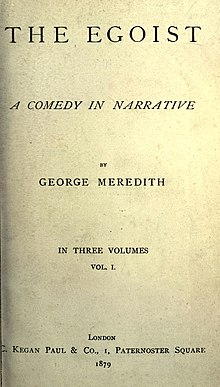 First edition title page | |
| Author | George Meredith |
|---|---|
| Country | England |
| Language | English |
| Genre | Tragicomical novel |
| Published | 1879 |
| Text | The Egoist at Wikisource |
The Egoist is a tragicomical novel by George Meredith published in 1879. [1] [2]
 First edition title page | |
| Author | George Meredith |
|---|---|
| Country | England |
| Language | English |
| Genre | Tragicomical novel |
| Published | 1879 |
| Text | The Egoist at Wikisource |
The Egoist is a tragicomical novel by George Meredith published in 1879. [1] [2]
The novel recounts the story of self-absorbed Sir Willoughby Patterne and his attempts at marriage; jilted by his first bride-to-be, he vacillates between the sentimental Laetitia Dale and the strong-willed Clara Middleton. More importantly, the novel follows Clara's attempts to escape from her engagement to Sir Willoughby, who desires women to serve as a mirror for him and consequently cannot understand why she would not want to marry him. Thus, The Egoist dramatises the difficulty contingent upon being a woman in Victorian society, when women's bodies and minds are trafficked between fathers and husbands to cement male bonds.
In an afterword by Angus Wilson, The Egoist was called "the turning point in George Meredith's career." Wilson saw Meredith as "the first great art novelist"; his afterword interprets the book as an adaptation of a stage comedy, an achievement he arrogates to few English authors, who, he suggests, present only "farce or satire." [3] He compliments Meredith most when he is detached from his characters, as "it is then that our laughter is most thoughtful." [4] Wilson is most taken by "the absolute truth of much of the dialogue," such as how "the way Sir Willoughby continues to speak through the answers of other characters, returning to notice their replies only when his own vein of thought is exhausted" is a "wonderful observation of human speech." [5]
In his essay "Books Which Have Influenced Me," Robert Louis Stevenson reports the following story: "A young friend of Mr. Meredith's (as I have the story) came to him in agony. 'This is too bad of you,' he cried. 'Willoughby is me!' 'No, my dear fellow,' said the author; 'he is all of us.'" [6]
E. M. Forster discussed the book in his lecture series Aspects of the Novel , using it as an example of a "highly organised" plot. [7] Much of his discussion, however, focuses on Meredith and his popularity as an author.
More materially, Forster compliments Meredith on not revealing Laetitia Dale's changed feelings for Willoughby until she rejects him in their midnight meeting; "[i]t would have spoiled his high comedy if we had been kept in touch throughout ... in fact it would be boorish. ... Meredith with his unerring good sense here lets the plot triumph" rather than explaining Dale's character more fully. [8]
Forster further compares Meredith with Thomas Hardy, complimenting Hardy on his pastoral sensibilities and Meredith on his powerful plots, "[knowing] what [his] novel[s] could stand." [9]

Dame Daphne du Maurier, Lady Browning, was an English novelist, biographer and playwright. Her parents were actor-manager Sir Gerald du Maurier and his wife, actress Muriel Beaumont. Her grandfather was George du Maurier, a writer and cartoonist.
In literary criticism, stream of consciousness is a narrative mode or method that attempts "to depict the multitudinous thoughts and feelings which pass through the mind" of a narrator.
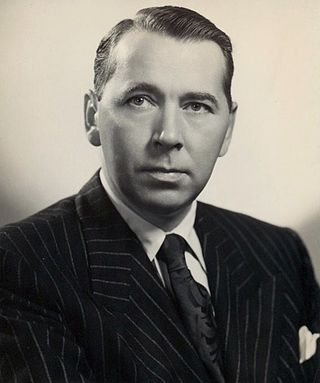
Alexander Knox was a Canadian actor and writer. He appeared in over 100 film, television, and theatrical productions over a career spanning from the 1920s until the late 1980s. He was nominated for an Oscar and won a Golden Globe for his performance as American President Woodrow Wilson in the 1944 film Wilson. However, his career in the United States was hampered by McCarthyism, and he spent the rest of his career in the United Kingdom.

Dame Margaret Drabble, Lady Holroyd, is an English biographer, novelist and short story writer.

The English novel is an important part of English literature. This article mainly concerns novels, written in English, by novelists who were born or have spent a significant part of their lives in England, Scotland, Wales, or Northern Ireland. However, given the nature of the subject, this guideline has been applied with common sense, and reference is made to novels in other languages or novelists who are not primarily British, where appropriate.

Sir Angus Frank Johnstone-Wilson, CBE was an English novelist and short story writer. He was one of England's first openly gay authors. He was awarded the 1958 James Tait Black Memorial Prize for The Middle Age of Mrs Eliot and later received a knighthood for his services to literature.
This article contains information about the literary events and publications of 1885.
You don't know about me without you have read a book by the name of 'The Adventures of Tom Sawyer'; but that ain't no matter. That book was made by a Mr Mark Twain, and he told the truth, mainly.

George Meredith was an English novelist and poet of the Victorian era. At first, his focus was poetry, influenced by John Keats among others, but Meredith gradually established a reputation as a novelist. The Ordeal of Richard Feverel (1859) briefly scandalised Victorian literary circles. Of his later novels, the most enduring is The Egoist (1879), though in his lifetime his greatest success was Diana of the Crossways (1885). His novels were innovative in their attention to characters' psychology, and also portrayed social change. His style, in both poetry and prose, was noted for its syntactic complexity; Oscar Wilde likened it to "chaos illumined by brilliant flashes of lightning". Meredith was an encourager of other novelists, as well as an influence on them; among those to benefit were Robert Louis Stevenson and George Gissing. Meredith was nominated for the Nobel Prize in Literature seven times.
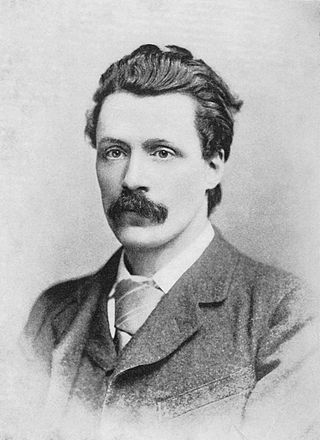
George Robert Gissing was an English novelist, who published 23 novels between 1880 and 1903. In the 1890s he was considered one of the three greatest novelists in England, and by the 1940s he had been recognised as a literary genius. Gissing's best-known works have reappeared in modern editions. They include The Nether World (1889), New Grub Street (1891) and The Odd Women (1893). He retains a small but devoted group of followers.

Opened in 1852, Mount Royal Cemetery is a 165-acre (67 ha) terraced cemetery on the north slope of Mount Royal in the borough of Outremont in Montreal, Quebec, Canada. Temple Emanu-El Cemetery, a Reform Judaism burial ground, is within the Mount Royal grounds. The burial ground shares the mountain with the much larger adjacent Roman Catholic cemetery, Notre Dame des Neiges Cemetery, and the Shaar Hashomayim Cemetery, an Ashkenazi Jewish cemetery. Mount Royal Cemetery is bordered on the southeast by Mount Royal Park, on the west by Notre-Dame-des-Neiges Cemetery, and on the north by Shaar Hashomayim Cemetery.
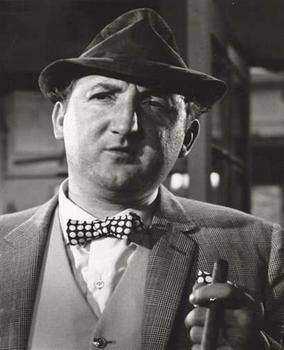
Ronald Fraser was a British character actor, who appeared in numerous British plays, films and television shows from the 1950s to the 1990s.

Dr. Jekyll and Mr. Hyde is a 1920 American silent horror film produced by Famous Players–Lasky and released through Paramount/Artcraft. The film, which stars John Barrymore, is an adaptation of the 1886 novella Strange Case of Dr Jekyll and Mr Hyde by Robert Louis Stevenson. John S. Robertson directed the production, and Clara Beranger wrote the screenplay, based on the 1887 stage play by Thomas Russell Sullivan that in turn was based on the novel.
Events from the year 1879 in the United Kingdom.

The Book League of America, Inc. was a US book publisher and mail order book sales club. It was established in 1930, a few years after the Book of the Month Club. Its founder was Lawrence Lamm, previously an editor at Macmillan Inc. The company was located at 100 Fifth Avenue, New York City, New York in a 240,000-square-foot (22,000 m2) office building that was constructed in 1906. It printed and distributed a variety of volumes in the 1920s, 1930s, 1940s, and 1950s. A victim of the Great Depression, the Book League of America was purchased by Doubleday in 1936.
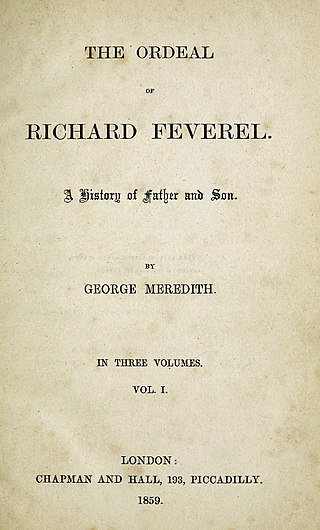
The Ordeal of Richard Feverel: A History of Father and Son (1859) is the earliest full-length novel by George Meredith; its subject is the inability of systems of education to control human passions. It is one of a select group of standard texts that have been included in all four of Everyman's Library (1935), the New American Library of World Literature (1961), Oxford World's Classics (1984), and Penguin Classics (1998). With its rigorous psychological analysis and criticism of contemporary attitudes toward sexuality, it has been seen by some critics as the first modern novel in English literature.

Andy Hardy Gets Spring Fever is a 1939 American romantic comedy film directed by W. S. Van Dyke. The plot is about Andy Hardy having a crush on his high school drama teacher, Miss Rose Meredith. It is the seventh of sixteen Andy Hardy films starring Mickey Rooney.

Outlaw is the first novel of the eight-part Outlaw Chronicles series by British writer of historical fiction, Angus Donald, released on 10 July 2009 through Little, Brown and Company. The début novel was relatively well received.
Moray David Shaw McLaren (1901–1971) was a Scottish writer and broadcasting executive.

The Mind of Mr. J.G. Reeder is a British television series which was originally broadcast on ITV in two series from 1969 to 1971. It is based on a series of novels and short stories written by Edgar Wallace featuring the character of J.G. Reeder, who had appeared in several film adaptations in the late 1930s. Sixteen episodes were made, all but two in black-and-white.

Resolution is a 2016 historical novel by English writer A. N. Wilson. It is a fictionalised account of the life of the 18th century German naturalist, writer and revolutionary George Forster. Main aspects of Forster's life covered by the novel include his participation in the second voyage of James Cook, his marriage to Therese Heyne and his experiences in the French Revolution as a protagonist of the Republic of Mainz. The book is based on historical sources including the journals of Cook and of Forster's father Reinhold as well as Forster's works, but includes also some invented figures and deliberately deviates from some historical facts.